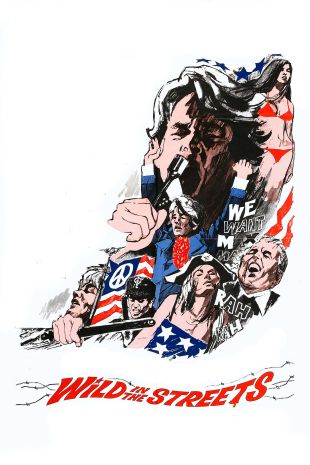
This potent, if ridiculous, slice of 1960s-era generation-gap paranoia was a big hit at the time of its release, not surprising given the way that it played both sides of the fence. Youthful viewers were no doubt empowered and excited by the film's depiction of teenage rebellion, while older members of the audience had all of their fears confirmed. Seeing Wild in the Streets out of context, it's clear where the filmmakers' sympathies lie; it's a delirious vision of youth power gone wrong, as well as a vicious attack on an emerging cult of youth that America still worships at the expense of experience and wisdom. The members of Max Frost's group are depicted as obsessed by their immediate chronological states. They must "stop the clock or go mad" and their insistence on a voting age of 14 is remarkably wrongheaded and shortsighted. Unlike the majority of their generation, each member of the band is an overachiever. Few teenagers possess genius IQs or have published best-selling books (like Richard Pryor's drummer character Stanley X, author of the "Aborigine Cookbook"), so using themselves as illustrations for the voting rights of children would, in a serious world, be easily argued away. They liken their social inequity to the plights suffered by minorities and females in quest of voting rights, despite the fact that their condition is temporary, and Frost's speeches are peppered with arrogant wisecracks that wouldn't hold water even with legislators terrified by the prospects of mass teenage revolt.
All of this doesn't prevent Wild in the Streets from being extraordinarily entertaining, more so in retrospect. The movie pulses with violent energy and a perfect narrative foil by veteran voice artist Paul H. Frees, who describes the proceedings with a sublime mixture of dramatic authority and sarcastic humor. True to production company American International's exploitation history, the film (though one of the studio's biggest-budgeted pictures at the time) contains a variety of technical gaffes beyond its obvious logical shortcomings, mainly in the many musical sequences. These actors are clearly not musicians, as is evident in their clumsy handling of the instruments (the band's bass player is able to perform on guitar and trumpet simultaneously, despite having a hook for his left hand!), and this again betrays the origins of the film as a propaganda tool of the older generation. Shelley Winters is at her histrionic best as the shrewish, incestuous mother who laughs away her son's basement laboratory filled with LSD and dynamite, eventually passing through a number of phases, from acid-addled hippie to delusional White House hostess. Fans of The Brady Bunch will be amused (or horrified) to view Barry Williams as a young version of Max Frost, inaugurating his film career with the immortal line, "Screw! All the kids think it's freaky!" Wild in the Streets ends with Frost being faced by the fact that what constitutes "youth" is entirely relative, but only after turning America into the vast playground that our baby boomer forefathers naïvely envisioned at the time. This time capsule of a picture provides modern viewers with a derisive view of the weird panic into which the love generation threw the country, along with some great (and some horrible) tunes in the service of clumsy social satire, which turns on itself as well as its target.
